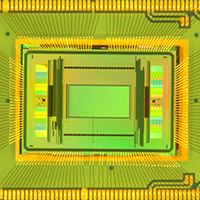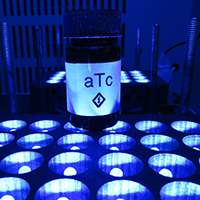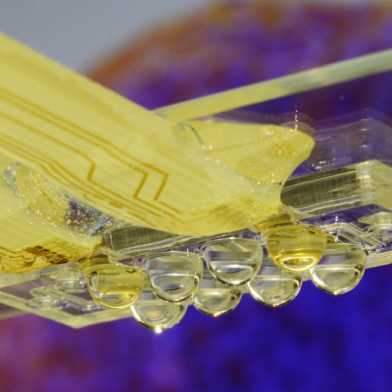09
Strong D-BSSE representation at FameLab Switzerland

At the Swiss Finals of FameLab, an international science slam competition, two out of 10 final candidates were from D-BSSE: Selen Manioglu (Müller group) presented on how she is ‘Fishing harmful bacteria with delicious antibiotics’, and Beichen Gao (Reddy group) pitched about ‘The mountains and valleys of antibody engineering’. The 3-min presentations had to be easy to understand by laypersons and convince the jury. Selen’s performance was rated best by the (virtual) audience. Congratulations!
Recording thousands of nerve cell impulses at high resolution

Researchers from the Bio Engineering Group led by Andreas Hierlemann have developed a new generation of microelectrode-array chips for measuring nerve impulses, enabling studies of how thousands of nerve cells interact with each other.
Mitigating the impact of limited cell resources on mammalian synthetic circuits

Synthetic gene circuits transferred into mammalian cells often show large discrepancies between intended and actual behaviour. Part of this problem is that gene expression depends on finite cellular resources. The Control Theory & Systems Biology Lab led by Mustafa Khammash and collaborators now experimentally characterised the effects of limited cellular resources caused by transient gene expression in mammalian cells and provided solutions to alleviate them.
D-BSSE alumnus awarded Branco Weiss Fellowship

Daniel Bojar, former doctoral student in the Biotechnology and Bioengineering group led by Martin Fussenegger and now postdoc at MIT Harvard, receives the prestigious Branco Weiss Fellowship to advance his research on data science including machine learning and data mining techniques applied to the biology of glycans. The five-year fellowship also allows him to build a small team - anywhere in the world. Congratulations, Daniel!
Engineered organoids provide mechanistic insights into retinal diseases

In a study led by the Institute of Ophthalmology Basel, Roland Diggelmann from Hierlemann’s Bio Engineering Lab used high-density microelectrode arrays to perform electrophysiological measurements of in-lab grown human 3D retinal organoids and human retinas. Applying a broad variety of biological and technological tools, the authors of the study published in Cell found that retinal organoids are fully functional models for studying human retinal disease mechanisms and repair.
Mapping the depths of the genome

Using algorithms to analyse the whole-genome sequence of a tumour can make treatment more successful – and can even help determine how cells become cancerous. At D-BSSE, Niko Beerenwinkel and his group are developing machine learning methods and software that can identify and interpret the significant genetic diversity in tumours.
Foundations for trustworthy artificial intelligence

Leading AI researchers from 30 top institutions across Europe are joining forces to form the European AI network ELLIS. Today, it celebrates its launch, with ETH Zurich as a founding member. Involving D-BSSE experts, the ETH Zurich ELLIS Unit is set on establishing the foundations for reliable and trustworthy artificial intelligence.
Let there be light and the process stops

Researchers from the D-BSSE Control Theory & Systems Biology Lab led by Mustafa Khammash have discovered that they can use light-sensitive molecules to switch genetic networks on and off as required. Their finding gives rise to an easy method for dynamically controlling biotechnological substance production.
Save-the-Date: D-BSSE Symposium on the spread of SARS-CoV-2

On 13 October 2020, 3-5 PM, D-BSSE is organising its 1st virtual Symposium around the question: "What do SARS-CoV-2 genomes tell us about their evolution and spread?" On the invitation of the organisers Tanja Stadler and Niko Beerenwinkel, Katia Koelle, Associate Professor at the Emory University, Atlanta/GA, USA, will give the keynote address.
Use of microtechnology enables relevance in physiological studies

How can microfluidic and microfabrication approaches make experiments more physiologically relevant? Andreas Hierlemann, head of the Bio Engineering Lab and colleagues provide their views on state-of-the-art microtechnological developments and devices. Simplified handling, precise spatiotemporal manipulation of cells and liquids, improved reproducibility and faithful recapitulation of cellular environments in tissues and at organ level boost the physiological relevance of experiments.